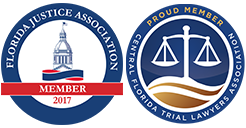Is uninsured motorist coverage really necessary?

Uninsured motorist coverage is, by far, the most valuable automobile insurance coverage you can buy. Even if you have health insurance, health insurance won’t pay for lost wages, past or future, nor will it pay for pain and suffering, disability or for the loss of enjoyment of life your injuries have caused you. Do not wait until you or a loved one has an accident and you find out the person causing the accident is not properly insured. Protect yourself and your family now, before it is too late. Uninsured Motorist Coverage cannot be added after you have had an accident. It must be in place before the accident.
So, if you have been in an accident, we can help you sort through the complex area of Florida automobile insurance to help determine what your rights are. Contact us or call our toll free number at (407) 423-1313 for a free consultation and evaluation.
So how do I adequately protect myself and my family?

There is one type of insurance coverage that will help to make sure you are properly protected in all circumstances. This insurance is called Uninsured Motorist coverage (it is commonly called just “UM”). Uninsured Motorist coverage is designed with one goal in mind….to protect you in all these situations. The name adequately describes what it does. It provides insurance coverage for your injury damages when the driver that causes an accident has little or no liability insurance.
So, when a driver who has no liability insurance causes an accident and injures you, you will be protected because you have Uninsured Motorist coverage. In essence, Uninsured Motorist Coverage fills in for the insurance coverage the negligent driver does not have.
Will full coverage completely protect me and my family?

Generally, the answer is no. If you are injured in an accident, you may be entitled to collect damages from the person who caused the accident, including unpaid and future medical bills, and lost and future wages, pain and suffering, and other damages.
In order to collect these damages, the person causing the accident must have Bodily Injury (BI) liability insurance. But what happens if the person that caused the accident only has PIP and Property Damage liability coverage, the minimum insurance required by law? In that case, there won’t be any liability insurance available to pay for your injury damages. They can pay to get your car fixed, but not pay for your injuries.
Unfortunately, there are many drivers in Florida that purchase the minimum insurance so that can get a registration and be legally driving on the road. In fact, you would be surprised at the number of drivers that are on the road with absolutely no insurance coverage at all. If you assume or take for granted that a person who causes an accident will have adequate insurance to pay your injury damages, you may be in for a rude an unpleasant surprise. And worse yet, it may come too late for you do anything about it.
What does liability coverage mean?

Liability coverage is a type of insurance that protects the person who is “liable” or, in other words, responsible for causing the accident. For example, if you have the Property Damage Liability coverage mentioned above, you are protected if you cause damage someone’s car in an accident. Your insurance will pay to have the car you damaged fixed. The same type of insurance is available if you want protection in case you injure someone in an accident you cause. That coverage would be called Bodily Injury Liability coverage. Again, since it is “liability coverage” protects, it protects you if you are the cause of an accident.
So this is full coverage?

Yes, full coverage, that is the insurance required to satisfy Florida law, only consists of PIP and Property Damage Liability coverage. While a policy with only PIP and PD is the minimum or smallest coverage you can buy in Florida to satisfy the law, this is considered to be “full coverage” under Florida law.
Why is property damage (PD) liability required?

Property damage liability coverage protects you if you cause an accident and damage someone else’s car or other property. This coverage only protects you from a claim made against you for property damage. It does not provide coverage for you to repair your car if it is damaged. You need Collision Coverage in that instance.
Property Damage liability coverage is the other coverage that is required by Florida law when you own a vehicle in the state of Florida. Just like PIP, you cannot buy a Florida automobile insurance policy without Property Damage liability coverage.
Who pays the rest of the medical bills and lost wages?

If you were not at fault for the accident, then you can recover any outstanding medical bills and unpaid lost wages look from the person that caused the accident. So in this instance, fault does matter when dealing with the bills and wages that remain unpaid after the PIP have paid its portion.
What will my PIP coverage pay for?

Under Florida’s No-Fault law, the PIP coverage will pay 80% of your medical bills and 60% of your lost wages. Again it does not matter who is at fault for the accident. The law provides a cap and limits the total amount that PIP can pay to $10,000.00. This includes payments for both medical bills and/or wages is $10,000.00.
Why should my PIP pay my bills if I was not at fault?

Some people ask, why should my insurance company have to pay my medical bills if I didn’t cause the accident? That is a good question. In states where No-Fault is not required, an injured person must look to the driver that caused the accident to pay his medical bills. However, what if you were at fault and caused your own injuries? How do you pay for your medical bills if you did not have health insurance? Or, what if neither driver admits that they were at fault or the police can not determine who is at fault for causing the accident? Then no one has any of there medical bills paid until the question of who is at fault is settled. This could take a long time and may even require a trial to determine who is at fault.
The Florida legislature said we are not going to make people determine who is at fault before they can get medical treatment. The No-Fault system provides everyone who is in an accident with insurance coverage to pay a portion of their bills and lost wages. This is not a perfect system but it is the law in Florida. And you should have attorneys who understand these laws.
What is Personal Injury Protection (PIP) coverage?

Don’t ALL automobile policies have the same coverages?

A policy of automobile insurance will contain many different parts called “coverages”. Some coverages are required by law and some are optional coverages. Some contain deductibles and some do not. The number of different coverages you can have under your policy is determined by how much you want to pay for that coverage. Here is a list of some of the possible coverages you can have under a Florida Automobile Insurance policy:
- Liability Coverage
- Collision & Comprehensive Coverage
- Towing and Rental Coverage
- Uninsured Motorist Coverage
- No-Fault or PIP Coverage
- Medical Payments Coverage
Some of these coverages are discussed below.
Do I have “Full Coverage” and is it enough?

Automobile insurance law in Florida is confusing. Many people believe that when they purchase “full coverage” they are fully protected from all consequences of an accident. Those people may be wrong. In Florida, “full coverage” only means you have the basic coverage required by Florida law, namely Personal Injury Protection (PIP) coverage and Property Damage (PD) liability coverage.
